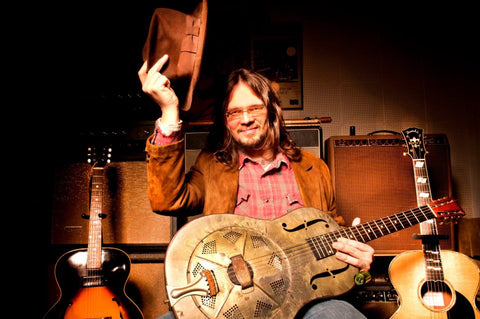Interview: Luther Dickinson

We recently caught up with one of our favorite guitarists, Luther Dickinson, of The North Mississippi Allstars. Luther was kind enough to give us some insight on the early days of the Allstars, his personal style of songwriting, the recently announced album from The Word, and the upcoming "North Mississippi Osbornes" tour with Anders Osborne!
------------------------------------------------------------------------------------------------------------
The North Mississippi Allstars began in 1996. It’s hard to believe that you guys are pushing 20 years. When did you realize that you guys had something so special?
Luther: Oh man…you know it’s funny. We grew up playing in Memphis, Tennessee, playing these all age funk shows. We were just this loud rock and roll band. And nobody cared, you know? Everything was non-consequential. But as soon as we started The Allstars, from the very first show, it was like Memphis embraced us for the first time. As soon as we started participating in this tradition of regional music, everything picked up, and it kept moving upward from there. So really, I have to say from the very beginning. It just felt like we were finally doing the right thing.
Being able to share this experience with your younger brother Cody (Dickinson) has to be a unique experience. When did you guys begin playing music together, and what were some of those pre-NMA experiences like?
Luther: We were just young kids. Cody and I had a band in elementary school, and we even played a couple of gigs. We both played guitar at the time, and then he started on drums when he was 11 or 12-years-old. That’s when I was really practicing guitar a lot. He was way more talented than I was, but thankfully I was driven enough to get it going. Our teenage years were a big turn in time for us. We were listening to a whole lot of Jimi Hendrix, like Electric Lady Ladyland, and the first Live and The Fillmore box set came out around then. And we were also taking a lot of psychedelics. That whole period in time really formed a good part of our future, sound, and style. We just really connected with Live at The Fillmore and everything Jimi Hendrix was doing. Then later, there were guys like R.L. Burnside, Junior Kimbrough, and Othar Turner. Everyone that was a part of North Mississippi Hill Country Blues was very influential. I grew up with no one here liking the blues. All of the sudden I realized, “Shit! This is modern day country blues right in my backyard.” And that literally changed my life.
Your style of slide guitar is one that can’t be mistaken and really defines the band. I have never seen anyone else play the “lowebow” though. Could you tell me a little more about that cigar box guitar, and how you began playing around with it?
Luther: My dad (Jim Dickinson) gave me my first cigar box guitar. Cody and I really liked playing homemade instruments; cigar box guitars, coffee can guitars, star box guitar…I’ve even got a gas can guitar. I think we even had a kitchen sink guitar. It really adds to it and makes it sound cool. Something we try and do is I guess what you could call “primitive modernism.” That’s what we’re trying to perpetuate. So playing loud, modern blues on a homemade coffee can guitar or an electric washboard, that’s right where we want to be.
When writing a new song, do you typically begin with the music or the lyrics? What does that process entail for you?
Luther: Man, it’s by any means necessary, you know? In the past, I’ve written lyrics on one hand, music on the other, then put them together. Then with The Allstars, I would try to incorporate that with we wrote together, or came up with at sound check, and write around it. Right now, what I’m trying to do is write the music and melodies based on the words. So it’s covalent, and it can be frustrating at times. It can feel like you’re trying to force two pieces of a puzzle together. I’m just trying to let the words dictate it all. I’m doing a lot of writing right now and getting ready for the future.
Last year, NMA was selected to be a part of Dead Man’s Town: A Tribute to Born in the USA. When did you first learn of this tribute project to Bruce Springsteen, and how did the selection process lead you to record “My Hometown?”
Luther: It just came down through the pipeline to us, and we were so excited. I’ve made a point to kind of rediscover that entire record recently, with the revelation that it is really a simple, folk rock record. Each song focuses on one element of 80’s style production, like one synthesizer or one drum sound, that makes it timely of that era. It’s really a pretty straight forward production, which I can appreciate. I had already gotten back into the record, and then we were asked to be a part of the record.
We had a little difficulty with “My Hometown” initially. Cody realized what the second verse actually says, surrounding some serious racial tension at that time, and he got pretty upset. It’s crazy because we have always played in integrated, Southern bands. We really can’t relate to that. We never really saw much violence or even bad vibes. We grew up with our generation in Mississippi, and we all got along, you know? It’s always gotten better in our hometown. Where we grew up, everything was cool. We struggled with that verse and even though about changing the words a little. But hopefully, this version represents the evolution since the trouble referenced in 1967. I’m proud to represent that.
One of your other projects, The Word, featuring yourself, Cody, Robert Randolph, and John Medeski, recently announced the release of Soul Food, the first album in 14 years, scheduled for May 5th. What can we expect from The Word’s second studio release? Could we see any future tour dates with both NMA and The Word?
Luther: Oh yeah…we are really excited about that. We already have several dates and festival appearances lined up with both the Allstars and The Word. It’s a dope record, man. We’ve got some cool, traditional soul tunes on there. There are some traditional gospel hymns that Robert (Randolph) brought in. The best thing about is really what we have evolved that band into over the years. At this point, we can do this type of ensemble improvisation that I haven’t done with any other band. It’s not jazz, but it’s the gospel style of improvisation. Of course, we are professional musicians. We’re following cues, and we know what to do. But there's also an element of just closing your eyes, having some faith, and letting it go. Just letting the music take control, so to speak. There are a lot of spontaneous jams in there that really blew my mind. So we’ve got everything from concise tunes, to freeform vibes, to fully improvised compositions. It’s all brand new stuff for us.

The North Mississippi Osborne’s tour, with Anders Osborne, kicks off in just a month and makes stops just about everywhere in the country. How did this idea come about, and what can we expect from the upcoming tour?
Luther: Ever since we first played together years ago, our paths have been so intertwined. We did some shows down at Tipitina’s together, and he asked me to do a full tour with him. We played together in Phil Lesh’s band too, and that was amazing. It’s hard to find a co-bill that really works. You have to have the right balance of like-minded girth, but that also appeals to different fans, so it raises the bar. What you’re basically doing can be pretty tricky. Working with Anders, everything fell into place from the start. We’re doing some studio recording in February. I hope to get in the mode into a new place for both of us, kind of like a funky, folk rock, Little Feat meets The Band sound. I really don’t want to be super loud and heavy, ‘cause that’s easy, and we can both do that. I want to use it as an excuse the stretch out and try new sounds.
You’ve been in this music scene long enough to fully experience the evolution of the music industry. How have you had to adjust, and what advice would you give to other young, aspiring musicians?
Luther: The main lesson I’ve learned...it helps, but it’s not economic. It helps creatively though. Having as many side projects and solo outlets as possible. When we were young, we would filter every idea and concept of a song through the Allstars, and it weakened the band. Everything is much stronger and stands up more upright if you put in its rightful place. Keep the acoustic instrumentals together. If you’ve written a bunch of psychedelic pop songs, make a psychedelic pop EP. Having a variety of touring outlets helps too. It’s really impossible to maintain just one band year round on the road. That’s a tough thing to do. Do anything and everything you can to create a nice variety, you know?


